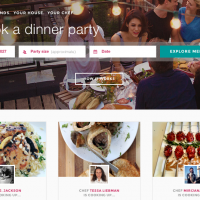
Guest post by Brian Witlin, COO at Yummly. The views expressed here are solely those of the author, and do not reflect the views of Food+Tech Connect.
You’ve been slaving away, creating your product and company while bearing the weight of the world on your shoulders. Now it’s time to take your company to the next level. You’ve reached out to your network for investor contacts, and now the all-important meeting with investors is booked. You have a month or so to prep. What do you do?
Investors can be tough, and you want to make sure you can roll with everything that is asked during your VC pitch presentation. For the novice, investor questions may seem perplexing, challenging, and hard to predict. Eventually you’ll discover there is limited universe of questions to be asked.
I have been through four fundraises, through good times and bad (see my post: 25 Ways Investors Will Reject Your Startup). I have found that while no entrepreneur has the best answer to all of the questions below, having a good prepared responses and a firm understanding of the 10 key topics make all the difference. While all of the questions in this series may not tie perfectly to your business (it primarily focuses on web and mobile companies), most of this applies widely and should help you prepare effectively for that pitch session.
1. Know Your Company: What You Do
This one should be a no-brainer for most founders. You essentially are the company. You live it, breathe it, and like it or not, sleep it too. In spite of this, many founders don’t have their elevator pitch streamlined. They’re too in the weeds.

There is a short window to pique the investor’s attention and the company intro is the time to do it. If you don’t grab their attention at the get-go, it’s all over. So make sure you have succinct and compelling answers to the following questions:
- What does your business/product do?
- Who are your users?
- What is your company’s mission?
- What is your long-term company vision?
- What is your exit strategy?
2. Know Your Team: Who You Have and Who You Need

Having a strong understanding of your team’s unique attributes, core strengths, and weaknesses will be critical to convey during your conversation. If you’re dealing with most smart investors, they will actually care more about the team than the technology (as strange as that sounds). In your conversation, it will be important to articulate a) why your team is uniquely positioned to win and b) that you have the self awareness to plan for hiring additional players (to fill voids in skill set and bandwidth) and c) have a sound plan of who you are going to hire, and how you are going to attract top talent. Here are some questions you should be prepared to answer:
- What makes your team special? Give examples.
- How have you and how are you going to out-recruit other startups? How about companies like Google and Facebook?
- What is your hiring plan over the next year? Two years?
3. Differentiation and Competitive Landscape: What Makes You Stand Out?
You are building something amazing and unique, of course! But much as you might see it that way, you need to succinctly convey this uniqueness and demonstrate how you’re going to win amongst a sea of competitors (many who have 100-1000X the resources of your team) is a challenge, but will be required to get the attention of investors. And it will be important to discuss your unique advantages over the competition. Be aware that “Why couldn’t Google just do it?” is a classic question. Here is what you need to know:
- Who are your top competitors?
- What gives you a competitive advantage in a crowded market?
- What are the barriers to entry?
- What is special/unique about the technology?
- Are there switching costs associated with moving to and from your product?
Stay tuned for Part II and III where I discuss product strategy, acquisition, engagement, retention, revenue, funding needs, and knowing yourself.
This post originally appeared on LinkedIn on August 19, 2014.
________________
 Brian Witlin is the Chief Operating Officer (COO) of Yummly. Brian is a serial entrepreneur and design leader who has co-founded and led three companies to successful acquisitions.Brian currently heads all mobile and platform expansion initiatives at Yummly, the fastest growing digital foodtech startup where he launched the #1 iOS recipe app and the leading recipe API platform.
Brian Witlin is the Chief Operating Officer (COO) of Yummly. Brian is a serial entrepreneur and design leader who has co-founded and led three companies to successful acquisitions.Brian currently heads all mobile and platform expansion initiatives at Yummly, the fastest growing digital foodtech startup where he launched the #1 iOS recipe app and the leading recipe API platform.
Prior to his tenure at Yummly, Brian served as the CEO and Founder of ShopWell, the first truly personalized nutrition resource (acquired by YottaMark).
Brian holds a Lecturer position at Stanford University’s Hasso Platner Institute of Design, serves as a startup mentor at 500 Startups and works with a portfolio of startups and IDEO’s Entrepreneurship Initiative. He has also formerly held EIR (Entrepreneur in Residence) positions at IDEO and StartX. He writes on the subject of entrepreneurship and startups on his blog DesignDoing and guest writes on occasion on VentureBeat.
Previously, Brian co-founded Golaces, LLC, a product company (acquired by a publicly traded footwear company) and LeverWorks, a software development consultancy (acquired by LEO Media – now Quasar Strategies).
Brian holds a M.S. in Engineering and Design from Stanford University and a B.S. in Business and Economics from Lehigh University. He is a classically trained artist/draftsman, an aspiring mixed martial artist, and has a love for his hometown Chicago-style hotdogs and deep-dish pizza.





